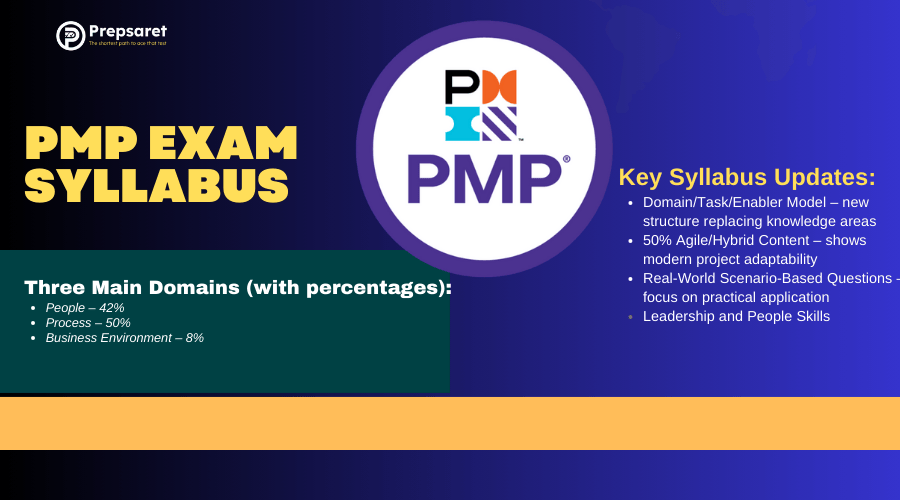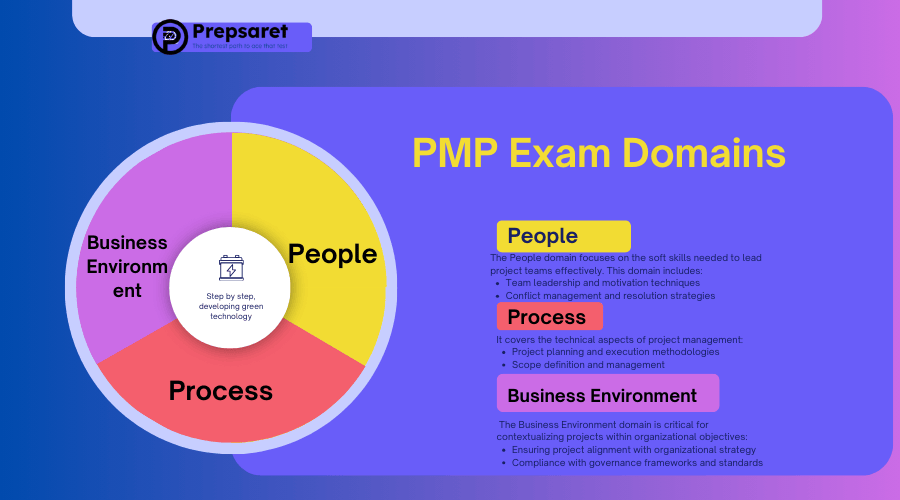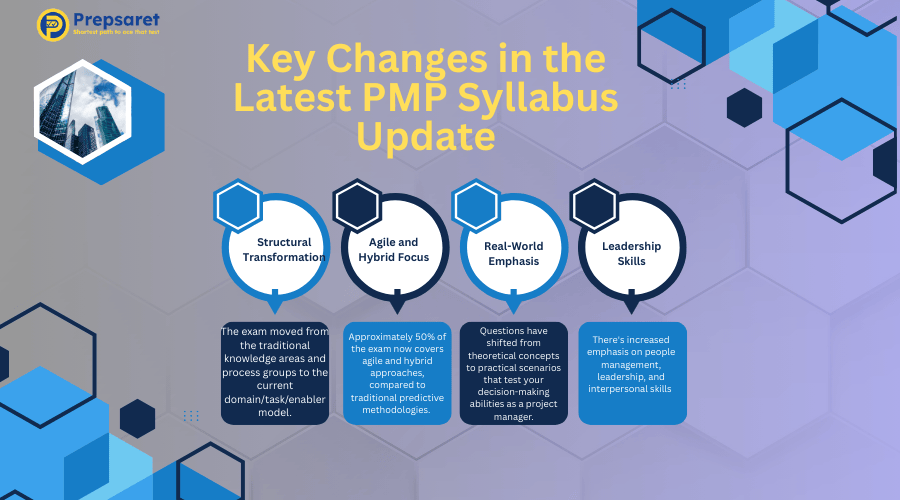The Project Management Professional (PMP) certification is a globally recognized credential that validates a project manager’s skills, experience, and ability to lead teams effectively. Understanding the PMP Exam Content Outline (ECO) is essential, as it defines the structure of the exam and the key domains tested.
The ECO ensures your preparation aligns with PMI’s expectations for certified professionals. Start your PMP journey today—prepare with Prepsaret’s high-quality practice tests and enhance your exam readiness with expertly designed resources that mirror the real exam format and complexity.
PMP Syllabus: Domains, Tasks, and Enablers
The latest PMP exam content outline is structured around three essential PMP domains and tasks that reflect the reality of today’s project management environment. These domains form the core of the PMP curriculum and determine what you’ll need to master to earn your certification.
What is included in the PMP exam syllabus? The PMI PMP syllabus is divided into three domains with specific weightage:
- People Domain (42% of exam questions)
- Process Domain (50% of exam questions)
- Business Environment Domain (8% of exam questions)
This domain-based structure aligns perfectly with the PMI Talent Triangle, emphasizing technical project management skills, leadership capabilities, and business acumen.
People Domain (42%)
The People domain focuses on the soft skills needed to lead project teams effectively. This domain includes:
- Team leadership and motivation techniques
- Conflict management and resolution strategies
- Stakeholder engagement and management
- Negotiation skills and influencing without authority
- Collaborative team building approaches
Project managers must excel at managing relationships and guiding team members toward successful outcomes. This domain evaluates your ability to connect with people and inspire them to perform at their best.
Process Domain (50%)
The Process domain forms the largest portion of the PMP exam structure. It covers the technical aspects of project management:
- Project planning and execution methodologies
- Scope definition and management
- Schedule development and control
- Budget creation and cost management
- Quality planning and assurance processes
- Risk identification and mitigation strategies
- Procurement management techniques
This domain tests your knowledge of project management principles and your ability to apply established methodologies to achieve project goals within constraints.
Business Environment Domain (8%)
Though smaller in weightage, the Business Environment domain is critical for contextualizing projects within organizational objectives:
- Ensuring project alignment with organizational strategy
- Compliance with governance frameworks and standards
- Benefits realization and value delivery assessment
- Managing organizational change and responding to external influences
These tasks evaluate your awareness of how projects contribute to broader business objectives and organizational success.
Throughout each domain, the PMP exam pattern includes specific tasks (what project managers do) and enablers (how they do it) that serve as the actionable components within the PMP exam structure.
Changes in the PMP Exam Syllabus
The PMP certification syllabus has undergone significant changes since 2021, with these updates carrying forward into the updated PMP syllabus 2025. Understanding these changes on the PMP exam syllabus 2021 is crucial for your exam preparation.
Key Changes in the Latest PMP Syllabus Update:
- Structural Transformation: The exam moved from the traditional knowledge areas and process groups to the current domain/task/enabler model. This shift reflects a more holistic and practical approach to project management.
- Agile and Hybrid Focus: Approximately 50% of the exam now covers agile and hybrid approaches, compared to traditional predictive methodologies. This change recognizes the growing importance of adaptive project management in today’s business environment.
- Real-World Emphasis: Questions have shifted from theoretical concepts to practical scenarios that test your decision-making abilities as a project manager. The exam now evaluates how you would apply knowledge in real-world situations.
- Leadership Skills: There’s increased emphasis on people management, leadership, and interpersonal skills – acknowledging that technical expertise alone isn’t enough for successful project management.
The PMP exam topics now better reflect the evolving nature of project work, where project managers must be versatile and adapt to various methodologies and environments.
Read more: How to Get PMP Certified
PMP Certification Exam Pattern and Structure
Understanding the PMP exam structure is essential for effective preparation. Here’s what you need to know:
- Total Questions: 180 questions
- Duration: 230 minutes (3 hours and 50 minutes)
- Breaks: Two 10-minute breaks are allowed
The PMP exam questions come in various formats:
- Multiple-choice questions (one correct answer)
- Multiple-response questions (select all that apply)
- Matching questions
- Hotspot questions (click on the correct area)
- Limited fill-in-the-blank questions
These questions are distributed across predictive (traditional), agile, and hybrid project management approaches. The exam doesn’t explicitly label questions by knowledge areas or process groups anymore, but understanding these concepts from the PMBOK Guide remains valuable for contextual knowledge.
The PMP exam content outline 2025 continues to reflect this balanced approach, ensuring that certified project managers are equipped to handle projects in any environment.
How to Study the PMP Exam Syllabus Effectively
Mastering the PMP exam syllabus by PMI requires a strategic approach. Here’s how to make your study time as productive as possible:
-
Align Your Study Plan with the ECO
Map your study schedule according to the three domains, with time allocation proportional to their weightage. Spend more time on the Process domain (50%) and People domain (42%), while ensuring adequate coverage of the Business Environment domain (8%).
-
Identify Your Strengths and Weaknesses
Take diagnostic tests to determine which areas need more attention. Focus your energy on strengthening weak areas while maintaining proficiency in your strong suits.
-
Utilize Essential Resources
To succeed in your PMP certification journey, it’s crucial to utilize essential resources that support effective learning, reinforce key concepts, and prepare you thoroughly for the exam.
-
- PMBOK® Guide (7th Edition): The fundamental reference for project management principles, covering eight performance domains and twelve key principles applicable across methodologies.
- Agile Practice Guide: Essential for understanding agile concepts, frameworks, and practices included in the PMP exam, focusing on agile and hybrid project management approaches.
- Online PMP Prep Courses: These courses offer structured learning with expert insights to guide you through the PMP syllabus effectively. When you enroll, you gain access to valuable resources such as practice exams and comprehensive study notes. For high-quality training, Prepsaret is highly recommended as it provides one of the best online PMP prep courses available, designed to help you master the material and boost your confidence.
- PMP Exam Prep PDF Materials: These downloadable PDFs serve as convenient reference tools, allowing you to review key concepts and processes anytime, anywhere. They are perfect for reinforcing your understanding and ensuring you have quick access to essential information during your study sessions.
- Practice Exams: Taking practice exams is crucial to assess your readiness and become familiar with the PMP exam’s question formats. Prepsaret offers the best free PMP practice questions with detailed answers, helping you identify your strengths and areas for improvement, ultimately increasing your chances of success.
-
Master Scenario-Based Questions
Practice analyzing complex scenarios and identifying the best course of action. Develop your ability to apply project management principles to real-world situations.
-
Implement Time Management Strategies
Practice answering questions within time constraints to build the pace needed for the actual exam. Aim to spend approximately 1.3 minutes per question.
The key to success is understanding not just what the correct answers are, but why they’re correct. This deeper comprehension will help you navigate the scenario-based questions that dominate the current PMP exam pattern.
Download the PMP Syllabus PDF
To ensure you’re studying the most current content, download the official PMP Exam Content Outline PDF directly from the Project Management Institute (PMI) website. This document provides the authoritative overview of what to expect on the exam.
The PMP exam syllabus PDF download is regularly updated to reflect changes in industry standards and best practices. Always verify you’re using the latest version for your preparation.
Having the official document on hand allows you to:
- Reference the exact tasks and enablers tested in each domain
- Understand the specific performance outcomes expected of a PMP-certified professional
- Create a comprehensive study plan based on official guidance
Remember that the official PMP exam reference list is also available from PMI, providing valuable resources for deepening your understanding of critical concepts.
FAQs About the PMP Exam Content and Syllabus
Can I Pass PMP in 3 Months?
Yes, passing the PMP in 3 months is realistic with dedicated study. Create a structured plan focusing on the three domains, allocate 1-2 hours daily, use quality resources, and take regular practice tests to track progress.
Is PMP Exam Hard?
The PMP exam is challenging due to its breadth of content and scenario-based questions. However, with proper preparation, understanding of the exam content outline, and consistent practice, it's definitely achievable for dedicated candidates.
Can I Prepare for PMP in 2 Months?
Preparing for the PMP in 2 months is possible but demanding. It requires intensive daily study (2-3 hours), laser focus on the exam syllabus, efficient use of quality resources, and strategic practice with sample questions.
Can I Study for PMP on My Own?
Self-study for the PMP is absolutely feasible. Many candidates succeed by using the PMBOK Guide, online resources, practice exams, and study groups. The key is discipline, structured learning, and consistent practice with exam-style questions.
How Many Times Can I Fail the PMP?
There's no limit to how many times you can attempt the PMP exam. However, you must wait one year after your third failed attempt before retrying. Each attempt requires paying the full exam fee again.
Get your PMP Certification Today!
The journey to PMP certification might seem daunting, but with the right understanding of the PMP exam syllabus 2025 and proper preparation, success is within your reach. Remember that this credential opens doors to exciting opportunities and significantly enhances your project management career.
The PMP certification demonstrates your mastery of global project management standards and your ability to lead teams and deliver results in any methodology – predictive, agile, or hybrid. Start your PMP journey today with confidence by leveraging Prepsaret’s comprehensive PMP practice tests – your partner in preparing thoroughly for exam success!




